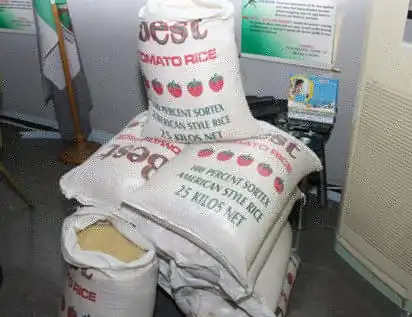 Sample of the seized rice
Sample of the seized rice
The recently seized rice by Nigerian authorities was not made of plastic, the National Agency for Food and Drug Administration and Control (NAFDAC) stated on Thursday.
However, the agency stated laboratory tests showed that the rice was contaminated with micro organisms.
The Acting Director General, NAFDAC, Yetunde Oni, stated this at a news conference in conjuction with the Nigeria Customs Service (NCS) in Abuja.
Oni stated the seized rice was unsatisfactory and therefore unwholesome for human consumption, stressing that the consignment would be destroyed upon handover by the NCS.
She explained that the product branded ”Best Tomato”, was in 25kg bag, without NAFDAC number, batch number, date markings and details of the manufacturer.
She stated that `floating’ was negative, sedimentation was positive, cooking was normal, odour was normal, colour was off-white and E-coli was within specification.
She stated lead and cadmium were not detected, pre-ashing was normal, ash, moisture and mould were within specification but coli form was above maximum limits.
Oni called on the public to report suspicious cases about all NAFDAC regulated products to any of the offices across the nation for prompt regulatory action.
She also stated that the following numbers could be contacted for enquiries: 08013630600, 09094262773 and 08033112282.
The Comptroller-General, NCS, Col. Hameed Ali, stated irrespective of the outcome of the laboratory analysis, customs would remain vigilant and alive to its responsibilities.
Ali, who was represented by the Deputy Comptroller-General, Tariff and Trade, Umar Iya, stated NCS was guided by intelligence reports.
”Intelligence reports indicate that several metric tonnes of expired and dangerous rice are still lying in wait in warehouses in neighbouring countries and the target of the products is the Nigerian market”, he stated.
Ali stated that the NCS would intensify patrols to ensure that such economic saboteurs do not succeed.
He urged warehouse owners and transporters across the country not to accept such smuggled products in their facilities or vehicles respectively.
He warned that both the smuggled products and means of conveyance were liable to seizure.